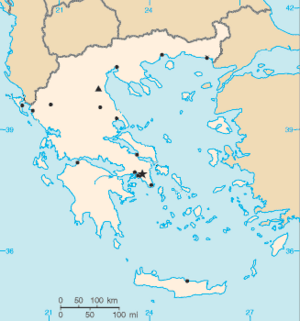Welcome to the Virtual Education Wiki ~ Open Education Wiki
Greece: Difference between revisions
NikkiCortoos (talk | contribs) (→Country education system: deleted Italian education system info.) |
No edit summary |
||
| Line 96: | Line 96: | ||
[http://www.syros.aegean.gr/users/tsp/citations_dnl/000185.pdf Distance Learning in Higher Education and Perspectives in Greece] | [http://www.syros.aegean.gr/users/tsp/citations_dnl/000185.pdf Distance Learning in Higher Education and Perspectives in Greece] | ||
---- | |||
[[Internal evaluation Greece]] | |||
---- | ---- | ||
> [[Countries]] | > [[Countries]] | ||
Revision as of 08:47, 8 January 2009
Greece in a nutshell
Greece, officially the Hellenic Republic, is a parliamentary republic; Greece is in southeastern Europe, situated on the southern end of the Balkan Peninsula. Greece is a developed country, a member of the European Union since 1981, a member of the Economic and Monetary Union of the European Union since 2001, NATO since 1952. Athens is the capital; Thessaloniki, Patras, Heraklion, Volos, Ioannina, Larissa and Kavala are some of the country's other major cities.
Greece's total area is 131,990 km², with a water percentage of 0.8669. According to the NSSG (National Statistical Service of Greece ), Greece's total population in 2001 was 10,964,020; extimated population in 2008 is 11,216,708, the 74th largest population in the World.
Country education system
Pre-education
Nursery schools (Παιδικός σταθμός, Paidikós Stathmós) are popular but not compulsory. Kindergartens (Νηπιαγωγείο, Nipiagogeío) are now compulsory for any child above 4 years of age.
Compulsory education
Children start primary school aged 6 and remain there for six years. Attendance at Gymnasia starts at age 12 and last for three years.
The primary level starts at the age of 6 until the age of 11.
Primary school: duration 5 years (6 y/old - 12 y/old children)
Gymnasia School: duration 3 years (12 y/old - 15 y/old)
After the primary school follows the Gymnasia until 15 years of age. At that age the compulsary education is completed.
Secondary education
Greece's post-compulsory secondary education consists of two school types:
- unified upper secondary schools (Ενιαίο Λύκειο, Eniaia Lykeia);
- technical-vocational educational schools (Τεχνικά και Επαγγελματικά Εκπαιδευτήρια, "TEE").
Post-compulsory secondary education also includes vocational training institutes (Ινστιτούτα Επαγγελματικής Κατάρτισης, "IEK") which provide a formal but unclassified level of education. As they can accept both Gymnasio (lower secondary school) and Lykeio (upper secondary school) graduates, these institutes are not classified as offering a particular level of education.
The Programme for International Student Assessment, coordinated by the OECD, currently ranks the Greek secondary education as the 12th in the world, being significantly above the OECD average.
Higher education
Public higher education is divided into universities, "Highest Educational Institutions" (Ανώτατα Εκπαιδευτικά Ιδρύματα, Anótata Ekpaideytiká Idrýmata, "ΑΕΙ") and "Highest Technological Educational Institutions" (Ανώτατα Τεχνολογικά Εκπαιδευτικά Ιδρύματα, Anótata Technologiká Ekpaideytiká Idrýmata, "ATEI"). Students are admitted to these Institutes according to their performance at national level examinations taking place after completion of the third grade of Lykeio. Additionally, students over twenty-two years old may be admitted to the Hellenic Open University through a form of lottery.
The Capodistrian university of Athens is the oldest university in the eastern Mediterranean.
Virtual initiatives in HE
| Nr. | Name | URL | Notes |
|---|---|---|---|
| 1 | Hellenic Open University | http://www2.eap.gr/frameset.jsp?locale=en | Students with a high school degree only, are able to enrol –usually on line- in theme units that substitute the traditional courses. During their courses they have to communicate with the instructor, they prepare assignments and they form on line groups with their co-students. |
| 2 | Aristotle University of Thessaloniki | http://www.auth.gr/home/index_en.html | Since 1997, there is an important effort to transform the bigger university in Greece in dual mode university that can provide a great part of graduate and postgraduate programs with both traditional methods and distance learning, with the creation of 6 virtual tele-classes and one tele-conference room. |
| 3 | Telematohs@University of Macedonia in Thessaloniki | http://www.uom.gr/index.php?newlang=eng | Telemathos aims at the production of multimedia educational material and provides e-courses concerning: “Business Administration”, ‘Sales techniques and marketing methods’, “Accounting and taxes”, “Evaluation of investment and exploitation of incentives”, for graduate students and professionals for their professional training and local economic development. |
| 4 | National Techincal University of Athens | http://www.ntua.gr/en_index.htm | The National Technological University of Athens (NTUA) supports the faculty and the students with distance learning infrastructure in terms of installations, audiovisual media and network equipment. |
| 5 | Athens University of Economics and Business | http://www.aueb.gr/index_en.php | The tele-education Centre of the Athens University of Ecomomics and Business materializes an application for the development of distance learning environment through the Lab. of Business Information Technology. The pilot web courses concern: Internet and E-commerce, Database for Business applications, Principles for the design and Implementation of Information systems and Business Information Systems, specifically created to support the needs of executives |
References
European Youth Portal > Studying > Greece
Distance Learning in Higher Education and Perspectives in Greece
